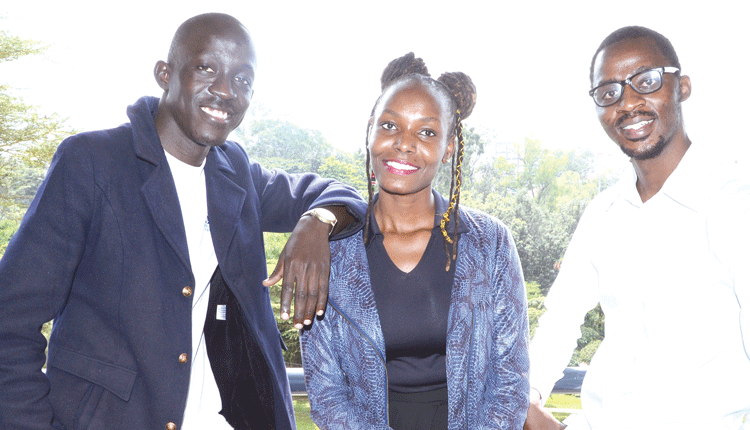Group out to filter indoor air
By Milliam Murigi, September 7, 2021
There is an increasing concern about air pollution levels both outdoors and indoors. However, most efforts have been concerted to fight outdoor pollution.
This is why indoor air pollution continues to take lives worldwide since many airborne pollutants continue to thrive inside.
The United States Environmental Protection Agency (EPA) says indoor air can be five times as polluted as outdoor air since it is not circulated as often as the latter.
Though people have been using air purifiers indoors, not everyone can afford them, since they are quite expensive.
It is against this revelation that four graduates, David Maina Ngamau, Caroline Wamuyu, Tonny Olela and Kenaz Odhiambo decided to come up with a solution against these silent killers by offering cheaper alternatives.
The team known as Klind Air from Jaramogi Oginga Odinga University of Science and Technology (JOOUST) have come up with an affordable air-purifying unit that can be used in the home, car, or office.
“Polluted indoor air is one of the leading courses of deaths as a result of respiratory diseases, that is why, at Klind Air, we inspire action against these silent killers by offering cheaper alternatives.

Solving the problem of poor air quality that risks health and productivity using air purifiers,” says Ngamau who heads the communications and technology department.
The idea was borne in 2019 when they wanted to come up with an artificial mangrove tree for their on-campus competition unsuccessfully. Mangrove is one of the best trees when it comes to air purification.
This failure pushed them to do more researh, and they realised there is a major gap when it comes to indoor air pollution control since available purifiers are expensive.
This is why they decided to come up with an affordable option with the help of their mentor, Gladwell Chege.
Additionally, indoor pollution is an untapped sector yet it possesses a big business potential.
What started as a campus project has now evolved to become a product, which is ready to be rolled out to the market for commercialisation.
Once in the market, it will be retailing at Sh15,000. This is quite affordable considering that available purifiers cost not less than Sh80,000.
Bamboo filters
“We believe that clean and safe air should be a necessity to all. Our target market is the middle and low-income earners since they are the most affected by air pollution.
The prototype is ready and we want to fine-tune it before it gets to the market,” adds Ngamau.
Their purifier comes with a monitor, which measures the air quality, detects the pollutants in the air, and analyses the quality of the air depending on the acceptable index and particles present in the air.
If the particles exceed the threshold required for safe air, which is between 0 and 50, purification automatically starts until the air quality levels are back to normal.
“Our goal is to measure air quality to drive changes in the society including slums, and clean polluted air indoors using locally made materials, to realise a healthy society with clean and safe air for breathing,” he adds.
According to him, quality air purifiers eliminate several types of indoor air and can remove up to 99.7 per cent of the airborne particulate matter (PM) circulating in your home environment.
Removing these pollutants can lead to several immediate and long-term health benefits such as better sleep quality and increased life expectancy.
The unit contains bamboo filters and a fan. This filter will capture particles as small as 1/3 of a micron in size, which is good enough for many allergens. The fan sucks in the air that passes through the inside filters.
These filters trap pollutants such as dust, pollen, and bacteria, and disperse clean air back into the room. This filtering process maintains healthy air circulation indoors.
“For now our prototype can measure and purify pollutants such as smoke, carbon monoxide, and dioxide, dour, formalene, nitrogen dioxide, fine particles, and dust,” says Ngamau.
Last year, the team was among 350 entrepreneurs from all over the world participating in Hult Prize competition.
The team won the Nairobi regionals and will be representing Kenya at the global stage during the final round of the programme in the United Kingdom this month.
Hult Prize is a worldwide student competition that challenges university teams to solve the most pressing global issues with viable business ideas.
Finalists pitch to a panel of esteemed judges, global business leaders, thought leaders, and change-makers to win $1million (Sh100million) to launch their enterprise.
Luckily prize has catered for their flights’ accommodation and food costs for the duration of the accelerator programme.
However, they are now faced with a heavy cost of quarantine of about Sh1.1 million for 10 days, which given the timeline they might not be able to raise on time as a team.
“Our country is among the red list country, which means that quarantining in a UK government facility is compulsory for us.
We kindly call upon Kenyans and all well-wishers to join our course and sponsor us in this matter to help us represent Kenya and Africa at our best and bring the prize home,” adds Ngamau.